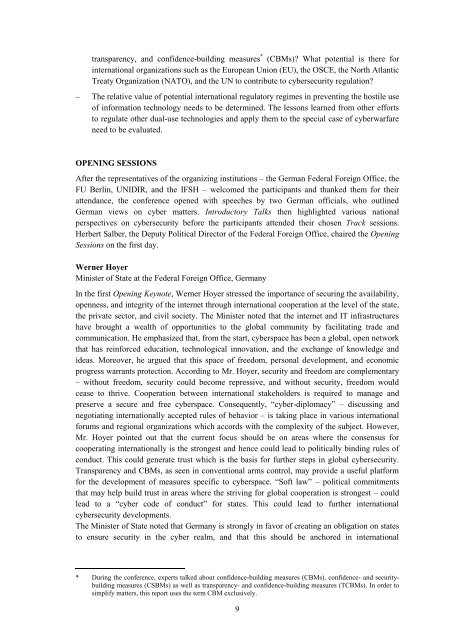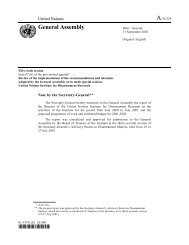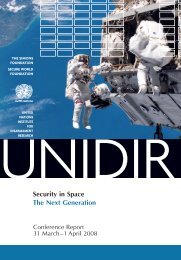Challenges in Cybersecurity Risks, Strategies, and ... - Unidir
Challenges in Cybersecurity Risks, Strategies, and ... - Unidir
Challenges in Cybersecurity Risks, Strategies, and ... - Unidir
You also want an ePaper? Increase the reach of your titles
YUMPU automatically turns print PDFs into web optimized ePapers that Google loves.
transparency, <strong>and</strong> confidence-build<strong>in</strong>g measures * (CBMs)? What potential is there for<br />
<strong>in</strong>ternational organizations such as the European Union (EU), the OSCE, the North Atlantic<br />
Treaty Organization (NATO), <strong>and</strong> the UN to contribute to cybersecurity regulation?<br />
� The relative value of potential <strong>in</strong>ternational regulatory regimes <strong>in</strong> prevent<strong>in</strong>g the hostile use<br />
of <strong>in</strong>formation technology needs to be determ<strong>in</strong>ed. The lessons learned from other efforts<br />
to regulate other dual-use technologies <strong>and</strong> apply them to the special case of cyberwarfare<br />
need to be evaluated.<br />
OPENING SESSIONS<br />
After the representatives of the organiz<strong>in</strong>g <strong>in</strong>stitutions – the German Federal Foreign Office, the<br />
FU Berl<strong>in</strong>, UNIDIR, <strong>and</strong> the IFSH – welcomed the participants <strong>and</strong> thanked them for their<br />
attendance, the conference opened with speeches by two German officials, who outl<strong>in</strong>ed<br />
German views on cyber matters. Introductory Talks then highlighted various national<br />
perspectives on cybersecurity before the participants attended their chosen Track sessions.<br />
Herbert Salber, the Deputy Political Director of the Federal Foreign Office, chaired the Open<strong>in</strong>g<br />
Sessions on the first day.<br />
Werner Hoyer<br />
M<strong>in</strong>ister of State at the Federal Foreign Office, Germany<br />
In the first Open<strong>in</strong>g Keynote, Werner Hoyer stressed the importance of secur<strong>in</strong>g the availability,<br />
openness, <strong>and</strong> <strong>in</strong>tegrity of the <strong>in</strong>ternet through <strong>in</strong>ternational cooperation at the level of the state,<br />
the private sector, <strong>and</strong> civil society. The M<strong>in</strong>ister noted that the <strong>in</strong>ternet <strong>and</strong> IT <strong>in</strong>frastructures<br />
have brought a wealth of opportunities to the global community by facilitat<strong>in</strong>g trade <strong>and</strong><br />
communication. He emphasized that, from the start, cyberspace has been a global, open network<br />
that has re<strong>in</strong>forced education, technological <strong>in</strong>novation, <strong>and</strong> the exchange of knowledge <strong>and</strong><br />
ideas. Moreover, he argued that this space of freedom, personal development, <strong>and</strong> economic<br />
progress warrants protection. Accord<strong>in</strong>g to Mr. Hoyer, security <strong>and</strong> freedom are complementary<br />
– without freedom, security could become repressive, <strong>and</strong> without security, freedom would<br />
cease to thrive. Cooperation between <strong>in</strong>ternational stakeholders is required to manage <strong>and</strong><br />
preserve a secure <strong>and</strong> free cyberspace. Consequently, “cyber-diplomacy” – discuss<strong>in</strong>g <strong>and</strong><br />
negotiat<strong>in</strong>g <strong>in</strong>ternationally accepted rules of behavior – is tak<strong>in</strong>g place <strong>in</strong> various <strong>in</strong>ternational<br />
forums <strong>and</strong> regional organizations which accords with the complexity of the subject. However,<br />
Mr. Hoyer po<strong>in</strong>ted out that the current focus should be on areas where the consensus for<br />
cooperat<strong>in</strong>g <strong>in</strong>ternationally is the strongest <strong>and</strong> hence could lead to politically b<strong>in</strong>d<strong>in</strong>g rules of<br />
conduct. This could generate trust which is the basis for further steps <strong>in</strong> global cybersecurity.<br />
Transparency <strong>and</strong> CBMs, as seen <strong>in</strong> conventional arms control, may provide a useful platform<br />
for the development of measures specific to cyberspace. “Soft law” – political commitments<br />
that may help build trust <strong>in</strong> areas where the striv<strong>in</strong>g for global cooperation is strongest – could<br />
lead to a “cyber code of conduct” for states. This could lead to further <strong>in</strong>ternational<br />
cybersecurity developments.<br />
The M<strong>in</strong>ister of State noted that Germany is strongly <strong>in</strong> favor of creat<strong>in</strong>g an obligation on states<br />
to ensure security <strong>in</strong> the cyber realm, <strong>and</strong> that this should be anchored <strong>in</strong> <strong>in</strong>ternational<br />
* Dur<strong>in</strong>g the conference, experts talked about confidence-build<strong>in</strong>g measures (CBMs), confidence- <strong>and</strong> securitybuild<strong>in</strong>g<br />
measures (CSBMs) as well as transparency- <strong>and</strong> confidence-build<strong>in</strong>g measures (TCBMs). In order to<br />
simplify matters, this report uses the term CBM exclusively.<br />
9








